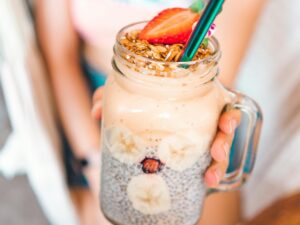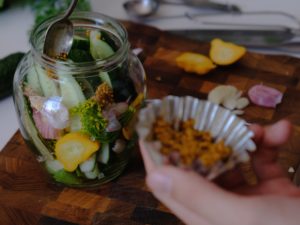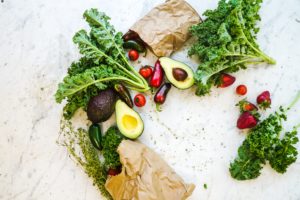5 Easy and Effective Eating Habits to Try in 2022 for Increased Fitness, Health, & Weight Loss
We all know it’s hard to stick to those new year’s resolutions, especially when they have to do with fitness, dieting, or weight loss.

But the road to wellbeing does not have to include restricted dieting or extreme changes.
We can make small changes that have huge longer term affects today!
Keep reading to learn the top tips to kick your body into shape through simple eating habits anyone can do.
1. Eat Whole Foods instead of Processed Food
Eating prepackaged or processed food can lead to many negative side effects.
The chemicals and preservatives found in them can sometimes harm your health, from decreased gut health to weight gain to allergic reactions.
When we replace prepackaged food with whole foods we have the benefit of fiber, no additives, and increase vitamins and minerals.
You can also buy frozen whole foods, as freezing is considered minimal food processing, and food maintains over 95% of nutrients.
Whole foods can help us feel fuller for longer as they have intrinsic fiber, vitamins, protein, and minerals.
While processed food may have fiber or be fortified with minerals, these are not the same as that in whole foods. Sometimes the body does not absorb it at all.
Check out a full list of ingredients to limit or avoid altogether here for more information!
2. Cut out Sugary Drinks
A lot of drinks have sugar nowadays.
This includes things like sodas, fruit juice, vegetable juice, sports drinks, and many more.
Many studies have linked all types of consumption of these sugary drinks as harmful, with an increased risk of heart disease, diabetes, and obesity.
This includes the consumption of commercial juices labeled as “100% natural.”
Did you know one can of soda has about 8 teaspoons of sugar?
Compare this to, for example, apple juice. Apple juice contains about 11 teaspoons of sugar.
Or with orange juice that contains about 10 teaspoons of sugar.
The World Health Organization (WHO) recommends a maximum intake of added sugar only be about 6 teaspoons a day (24 grams) for women and 9 teaspoons (36 grams) of added sugar for men.
Sugary drinks are empty calories that don’t satisfy food cravings nor do they fill you up.
The problem with fruit juice or V8 vegetable juice is that it contains fewer vitamins and minerals with none of the fiber of real whole fruits and vegetables.
Many orange juices labeled as natural have artificial coloring and flavors, keeping it at a low percent to avoid adding it to the ingredient lists of the product.
3 Eat Until You’re 80%
That is, eat until you’re 80% full.
Why does this work?
Eating until you’re 80% full reduces the chances that you are overeating.
It also takes time for the brain to acknowledge you’re eating. The 80% rule may cause you to feel completely full for a brief period as the brain sends signals to the body that you have eaten.
This is a practice in many Asian regions just as China, Korea, and Japan, where it is less common to be overweight and obesity is low.
4 Eat Foods with a Low Glycemic Index
This is a great strategy if you want to maintain a healthy body weight this year!
A glycemic index is a measurement of how fast sugar is released into the blood after it is digested.
Low glycemic foods are those that do not raise the blood sugar level of the body drastically.
Whole grains like quinoa will result in a slower release of sugar into the blood. Something with simple sugars like white bread will cause sharp spikes in the blood.
When blood sugar is raised, insulin is released to bring blood sugar back down to normal levels.
When blood sugar spikes occur, it leads to sharp insulin spikes that cause unstable levels and in the long run, may cause insulin resistance (when the body needs more and more insulin to work on the same amount of sugar).
These spikes also may cause hunger to come back tenfold and can lead to overeating and weight gain.
No matter what meal plan or diet you are on, it is important to eat foods that do not raise blood sugar.
Eating foods high in fiber or pairing food with healthy protein and fats can reduce the glycemic index of a meal, stabilizing blood sugar, weight, and overall wellbeing.
5. Drink Water or Tea 30 minutes Before a Meal
Drinking water before a meal can have many beneficial effects.
Doing this can not only increase feelings of fullness, but it will help prevent you from overeating during your meal.
Don’t drink too much though, as it can dispute the body’s electrolyte and sodium balance.
Ensure you drink 30 minutes before a meal to not dilute stomach acids right before eating as well.
The Takeaway
Simple eating habits can make a world’s difference in terms of health and overall wellbeing.
Try to consume whole foods when possible and reduce sugary drinks.
Water is always going to be the best form of hydration for the body, and drinking it 30 minutes before a meal can actually help reduce hunger.
Eating until you’re 80% full can also reduce overeating and help the body maintain a healthy weight.
Remember that health comes from within!
Choose nutritious food to fuel your fitness journey and watch how health flourishes!
Want to start a healthy keto diet but don’t know how to? Check out all the resources here and look for the ketogenic kick-start guide today!





